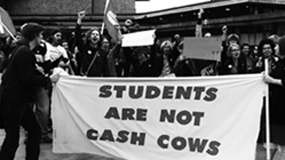

Arguments surrounding tuition are never in favour of higher fees or more debt. So, why do we pay so much and continue to do nothing?
Arthur spoke with two students, Joé Dufour et Mathieu Gilbert Thévard, who were part of the Québecois student strike (aka Le Printemps Érable [The Maple Spring]). All translations and interviews were conducted and paraphrased by Québecois student, Trent alumni, and sustainable builder, Jakub Misiek. The reason we pay so much in tuition is clear to Joé, “The other students in Canada are very passive.”
He acknowledges though that students in English Canada may just “have other styles of making their demands,” but he thinks “access to education and the price of university is something very important for which the Canadian-Anglophones should fight more for.”
Mathieu says that “the rest of Canada have to contest [protest] like us and that the rest of the world have to contest like us,” if they believe in lower tuition, but warns that “it’s really not easy.” He continues, “All the spring we contest, the majority of Cégeps and Universities strike and lost their school session. They put a lot of energy towards the cause.”
The loss of a school term seems like a large sacrifice, but for many involved, according to Mathieu, “There is not a lot of sacrifice. Manifestation [protests] are not sacrifices. Some people did not eat (fasted). That was a sacrifice, but contesting the government is not a sacrifice.”
Now that the the Québecois government has rescinded the decision to increase tuition by $325 a year to $75 a year, many student strikers can say, “we won our cause but lost the school session.”
For Joé though, the strike caused heated discussion at the dinner table. “It was the moment of my life with the most tension, amongst my family, my mom, and my dad. There was more arguing… It made an explosive mix in our family. I believe this to be a difficult sacrifice that we have made.”
A stark reminder that there were mixed feelings in Québec about the strike. Mathieu reminds Arthur that “we [student protesters] met resistance from other students. Not all the students were in the contestation [on strike]. Some students were for the decisions of the government. There were two camps.”
Not all teachers were in solidarity as well. Some, while personally supporting students, could not officially support the student action because they work for the government and their pay and pension are at stake.
“The problem is that the teachers are paid by the government and can do nothing to contest the government or they will cut the cash for their retirements. They are in link with the government. They cannot speak openly about this. Sometimes, personally, the teachers would encourage the students.”
While this was Mathieu’s experience of teacher solidarity, Joé, a professor’s son, had a different experience.
“Almost every professor at our school was with us, openly. This is thanks to the culture of protestation in Québec. When they were young they protested as well. There were about eight (I’m not sure of the figures) big student strikes in Québec since the 60s. Each professor has striked before in their lives… I believe that the force of the student hand is a force that is very structured. Student associations are very structured. Other students who were against us were not structured. They did not have a common argument. This is similar with the profs. There were some that were against, but the teacher’s unions were for.”
Some dissent for the strike may have come from rogue students and teachers, but it was the police and the government that provided the most resistance, Mathieu recalls that “the police also showed us a lot of violence… In all manifestation there is a portion that overreact, then the police begin the violence. But the violence came from both sides. It’s a bit of a defeat for either side.”
But some of the largest protests during Le Printemps Érable were also some of the most peaceful. “At UQAC (Université of Québec at Chicoutimi) almost half the university was on strike,” says Joé.
He continues, “There are stories of police entering the pavilions to remove students who were protesting. There were many arrests. Cégep was calmer, but I believe that the students, even from small towns, were filled with a great resistance.”
Resistance met resistance as student protesters continued to protest the tuition hike. Mathieu is proud of his fellow students for not backing down: “The biggest resistance was from the government. The government did not move to heed this decision. We did a lot of things to resist the government, they were like ‘we will not move,’ but we continued, and we won.”
If students in Ontario were to strike, both Mathieu and Joé have no doubts that Québecois students would protest in solidarity. Matheiu says, “If you will contest your provincial government, me, I will encourage you.”

